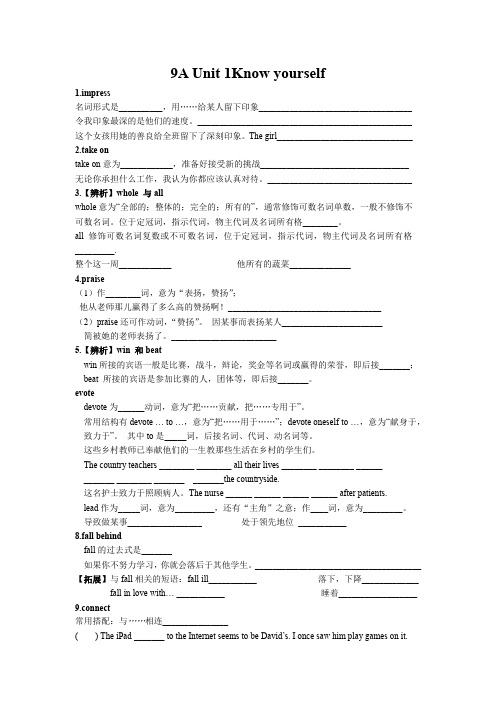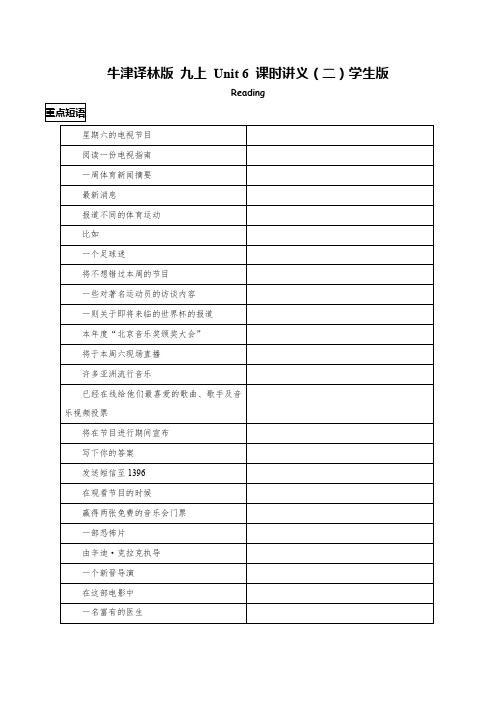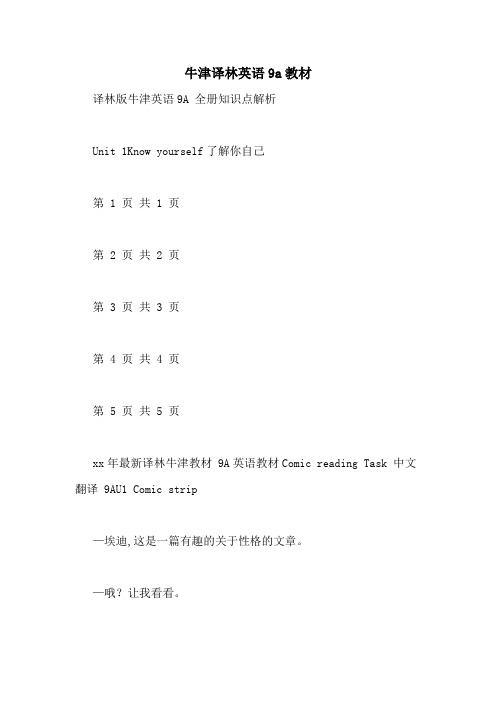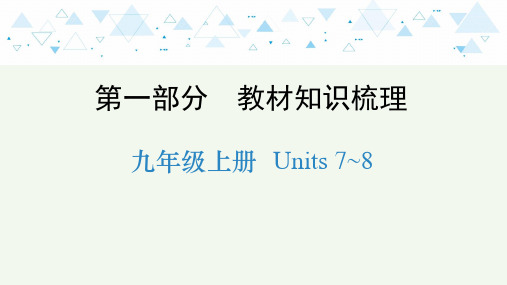牛津译林版9年级上 教材全 解
- 格式:pdf
- 大小:562.64 KB
- 文档页数:69

9A Unit 1Know yourself1.impress名词形式是__________,用……给某人留下印象___________________________________令我印象最深的是他们的速度。
_________________________________________________这个女孩用她的善良给全班留下了深刻印象。
The girl_______________________________ 2.take ontake on意为____________,准备好接受新的挑战__________________________________无论你承担什么工作,我认为你都应该认真对待。
_________________________________ 3.【辨析】whole 与allwhole意为“全部的;整体的;完全的;所有的”,通常修饰可数名词单数,一般不修饰不可数名词。
位于定冠词,指示代词,物主代词及名词所有格________。
all修饰可数名词复数或不可数名词,位于定冠词,指示代词,物主代词及名词所有格_________.整个这一周____________ 他所有的蔬菜______________4.praise(1)作________词,意为“表扬,赞扬”;他从老师那儿赢得了多么高的赞扬啊!___________________________________(2)praise还可作动词,“赞扬”。
因某事而表扬某人_______________________简被她的老师表扬了。
________________________5.【辨析】win 和beatwin所接的宾语一般是比赛,战斗,辩论,奖金等名词或赢得的荣誉,即后接_______;beat 所接的宾语是参加比赛的人,团体等,即后接_______。
evotedevote为______动词,意为“把……贡献,把……专用于”。

9A Unit 1 Know yourself第一课时Welcome to the unit1. But he is modest and never shows off.① show off炫耀;卖弄show off sb. Eg. show off his excellent son炫耀他优秀的儿子show off sth. ( to sb.) Eg. show off her new car to others向别人炫耀她的新车★宾语为代词时放中间show it/ them offshow off+宾语从句Eg. He often shows off how well he speaks Chinese.他经常炫耀他汉语讲得如何的好。
② show.引,带,领;教,演示,展示(show- showed-showed/show- showed-shown)show sb. around.领某人参观show us how to use the computer给我们演示如何使用电脑③ show n.演出,秀Eg. a fashion show一场时装秀2. Suzy is well organized. She keeps all her things in good order.① order n.顺序;命令,指挥,要求order vi&vt. 点(菜);订购keep… in (good) order 使…保持井然有序→sth. be kept in(good) order.某物井然有序obey the order服从命令order a robot online网上订购机器人(指预订物品)★book(指预订机票、房间等服务类项目)②keep vt.保持;养,饲养;留有,不退还( keep-kept-kept)keep sb./sth.+adj. 使某人/某物保持某种状态keep (sb.) doing使某人一直做某事keep on doing不断做(含“反复做”之意)★keep是borrow对应的延续性动词Eg. How long can I keep the book? 这本书我可以借多久?3. He often comes up with new ideas① come up with… 想出(主意)= think o f…Eg. come up with such a good idea想出这么好的一个点子( come-came-come)②与come相关的其他词组come down崩塌come from来自come on来吧,赶快come true变为现实come first第一come straight towards…朝……径直过来4. Hobo, you’ve eaten up my breakfast.① eat up sth./ eat sth. up宾语为代词时放中间Eg. eat it up②部分动词和up连用时有“完,光,结束”的意思burn up烧光use up用完finish up做完dry up干涸drink up喝完end up结束第二课时Reading 1I. His sculptures… have won high praise from the art community① praise un.赞扬,表扬Eg, win high praise from 赢得…的高度赞扬be full of praise for his progress对他的进步赞不绝口(for表原因)② praise vt. 赞扬,表扬praise sb. for sth.( highly)Eg. praise her for her beautiful handwriting 赞扬她优美的书写2. Liu Hao is the chief engineer of the high-speed railway connecting Sunshine Town to Tianjin.① connect vt.连接( connect-connected-connected/ connecting)②主动用法connect A to/ with BEg. The Internet connects us to the world.因特网把我们和世界连接在了一起③被动用法be connected to/withEg. Wuxi is connected to Nanjing by the railway,这条铁路把无锡和南京连接起来④作定语后置Eg. the underground connecting the town to the city centre. 连接域镇和市中心的地铁(表主动) the mouse connected to the computer连接到电脑上的鼠标(表被动)3. Carelessness will be a disaster not only to ourselves but also to patients① carelessness un.粗心Eg. a moment of carelessness 一时的疏忽大意He failed in the exam because of his carelessness他因为粗心而没通过考试。

最新牛津译林版9上Unit 1 Know yourself教材同步解析与练习一、课本中重点词、短语、句型讲解▲Comic strips & Welcome to the unit1. Eddie, here’s an interesting article about (on) personality.埃迪,这有一篇关于性格的有趣文章。
personality 意思为“个性,性格”,可数名词,复数形式为personalities。
如:She has a very warm personality.她性格非常热情。
What kind of personality do you think you have? 你认为你自己具有什么样的个性。
What can they tell us about your ability and personality? 他们对你的能力和个性会说些什么?拓展:test personality“性格测试”;healthy personality “健康人格;健全人格”。
2. It says some people are generous. 文章里说有些人是很大方的。
(it代替article)(1)It says (that从句) --- 意为“---说----”,“---上面写着----”,多用于表示标语、指示牌、告示、通知等物体上的内容:例如:There is a sign on the wall. It says “No Smoking”.拓展:It is said (that从句)---意为“据说---”的意思,用于表述听说、传闻等不确定的情况。
It代替一个完整的句子作形式主语。
例如:It is said that he will be fired. 据说他将被解雇。
It is said it will be hotter tomorrow than it is today.(2)generous adj. (形容词)“慷慨的,大方的;宽宏大量的”;其反意词为selfish“自私的”。

牛津译林版九上Unit 6 课时讲义(二)学生版Reading1. A weekly roundup of what is happening in sport, with upto date information. 一周体育新闻摘要及最新消息。
weekly:adj.“每周的;每周一次的”。
adv.“每周;每周地”。
_________:“每天的”;__________:“每月的”;___________:“每年的”。
roundup:n.“(尤指新闻)概要,摘要”(主要指广播或电视里新闻的概要)。
_____________________“……的概要/概要”。
happen:vi.“发生”,表示偶然发生的事(没有被动语态);“碰巧”。
_____________________________ “某人/某物出了某事”;________________“碰巧做某事”。
___________:“举行”(无被动)。
指事先布置或策划好,然后发生的事情。
hold:“举行”(有被动)。
主语通常是人。
uptodate:adj.“最新的,现代的”。
__________________________“给某人提供最新信息”。
2.The programme covers different sports, such as swimming, basketball and football. 本节目报道不同的体育运动,如:游泳、篮球和足球。
cover:vt.“报道;电视报道”;“覆盖;掩盖”。
_________________“用……覆盖……”;__________________“被……覆盖”。
n.“封面,盖子”。
3.There are a number of interviews with famous players. (本节目中)有一些对著名运动员的访谈内容。
_____________:“一些;许多的;若干的”(= many),后接可数名词复数。

Unit 1 Star signs重点短语:worry about为(对)......担心argue with 与.....争吵be familiar with sth. 对某物熟悉(通晓)ask for 请求to sb. 为某人所熟知dream about 梦见give up 放弃find out查出;发现,弄明白pay attention to 注意be able to能够show off 炫耀,卖弄come up with想出,提出交际用语:It’s nice of you to bring me the newspaper.I’m patient enough to wait for two hours.You should read your stars. It’s very interesting.It says I’ll have lots to eat and drink today. I won’t be hungry.语法:(1)“It’s+ adj. + of/ for sb. +to do sth.”句型It’s kind of you to help me with my work.(2)“Sb.+ be+ adj. +enough + to do sth.”句型I’m patient enough to wait for two hours.(3)不同句子成分语言知识精讲:1.It’s nice of you to bring me the newspaper, Hobo.bring vt. 意为“拿来,带来”,一般指方向转向说话人,指将远处的东西拿(带)到说话人所在的地方来,即由远及近。
辨析:bring,take与get①bring意为“拿来,带来”,指将远处的东西拿到说话人所在的地方来。
The teacher told us to bring our homework to school tomorrow.②take意为“拿走”,一般指将某物从说话人之处拿走,即由近至远,与bring方向相反。

牛津译林英语9a教材译林版牛津英语9A 全册知识点解析Unit 1Know yourself了解你自己第 1 页共 1 页第 2 页共 2 页第 3 页共 3 页第 4 页共 4 页第 5 页共 5 页xx年最新译林牛津教材 9A英语教材Comic reading Task 中文翻译 9AU1 Comic strip—埃迪,这是一篇有趣的关于性格的文章。
—哦?让我看看。
—它说有些人很慷慨。
他们感觉与其他人分享东西很好。
—对,我同意。
—我很慷慨。
—是的,你是。
—霍波,你把我的早餐吃光了 !—但这会让你感觉很好啊!9AU1 Wele to the Unit米莉和她的同学们正在讨论他们自己的性格以及他们喜欢或者不喜欢哪种工作。
分小组讨论一下你们自己。
用下面的对话作为模版。
米莉:我很有耐心,不容易生气。
我认为我会是一名好老师或者一名好医生。
你呢,保罗?保罗:我有时候很粗心。
我父母和我都认为我不能做一名好会计,你喜欢什么工作,桑迪?桑迪:我的美木老师说我经常有令人兴奋的主意。
我喜欢创造性的工作。
你呢,戴维?戴维:我很活跃,我喜欢与人交谈。
对于我来说,整天工作而不说话很可怕。
9AU1 Reading吴维,艺术家:“吴维是一位天生的艺术家,”他最好的朋友说。
“他很安静,话不多,但是他的作品却极具说服力!”吴维——年轻的艺术家,他富有创造力的作品给全国留下了很深的印象。
他给阳光镇广场做的雕塑赢得了艺术协会的高度赞扬。
他说:“我想与人们分享最好的艺术,因此我总是搜索一些更好的或不同的东西。
这本身就是非常有趣的事。
”苏宁,经理:五年前,苏宁放弃了她的会计工作,并开始在一家大公司的销售部门工作。
“我活跃并且精力充沛,我喜欢和人们在一起工作。
然而,在我的上一份工作中,我只能日复一日地跟数字打交道。
那使我不开心。
”现在苏宁是这家公司的总经理。
她说:“人生就像一场赛跑。
你要么领先要么落后。
我随时准备好迎接新的挑战。
”刘浩,工程师刘浩是阳光镇到天津这段高速公路的首席工程师。


牛津译林版9AU1知识点讲解1.知识目标:学生能够掌握第一单元的短语和词汇。
2.技能目标:学生能够掌握并列连词的用法3.情感目标:学生能够学会了解自己的个性连接词用法用法【用法详解】make v.使,让,为使役动词,后面一般跟动词原形,名词形容词做宾语的补充。
被动:sb be made to do sth.例:1.My little sister is cute,she always makes us laugh.(we are made to laugh by her.)我的妹妹很可爱,她总能让我们笑。
2.She made Miss Suzy her math teacher.她让Suzy做她的数学老师。
3.Don’t make ourselves helpless.不要让我们自己处于孤立无援的状态。
4.It makes them feel good to share things with others.(课本原文)和别人分享东西,让他们感觉很好。
【典例讲解】1.The accountant was made_______the number again.2.Wuwei always made his grandmother_______(happy).知识点2.eat up用法【用法详解】eat up 吃光若有代词和它搭配,则代词放在中间。
例:1.I bought an apple and I ate it up in the afternoon.我买了个苹果并在下午吃光了它。
2.Hobo,you’ve eaten up my breakfast!(课本原文)Hobo,你吃光了我的早餐!类似短语:clean up 打扫干净mop up拖干净give up放弃turn up调高make up化妆;编造【典例讲解】1.(2023·江苏徐州·统考三模)—It’s a good habit to save food.—I agree, so I always ________ the food on my plate.A.eat away B.eat up C.put away D.put up知识点anized&order用法【用法详解】相关短语:keep...in (good) order 使……保持井然有序in order to 为了...例:1.We were ordered to finish the task before tomorrow.我们被命令明天前完成这项任务。

千里之行,始于足下。
...知识点+2022-202X学年牛津译林版九年级英
语上册
牛津译林版九年级英语上册是根据英语教学大纲编写的,主要涵盖了英语基础知识、语法、阅读、听力、口语和写作等方面的内容。
以下是一些主要的知识点:
1. 语法:包括时态、被动语态、直接间接引语、虚拟语气、情态动词等。
2. 词汇:包括基础词汇、常见短语和惯用语等。
3. 阅读:包括理解文章主旨、阅读理解、填空和完形填空等题型。
4. 听力:包括听力理解、听力填空、听力选择等。
5. 口语:包括日常生活用语、简单对话、问答式练习等。
6. 写作:包括写作常用句型、段落写作、情景作文等。
关于具体的内容,可以根据具体的单元进行查阅教材。
希望以上内容能对你有所帮助!
第1页/共1页。



最新牛津译林版9上Unit 4 Growing up教材同步解析与练习▲Comic strips & Welcome to the unit1. —What’s on your mind, Eddie? —I’m worried. Growing up is hard! —埃迪,你在想什么? —我很担心你。
成长是很困难的!(1)短语on one’s mind意思是“(有事)挂在心上;烦恼”。
如:Don’t bother him. He’s got a lot on his mind.别打扰他了。
他烦心事够多了。
You look very worried. Is there anything on your mind?你看起来很焦虑,是不是有什么心事?拓展一:change one’s mind “改变主意”;make up one’s mind to do sth. “下决心做……”;keep sth. in mind“记住……”。
如:Whether you agree or not, I shall not change my mind.如:I make up my mind to learn English from now on.如:I will keep the word in my mind.(2)Growing up is hard!“成长是很困难的!”动名词短语做主语,谓语动词用单数。
如:Reading in the sun is bad for your eyes.Doing morning exercises is good for your health.2. —What’s up? You’ve been happy since I first met you. —I’m growing too big for my house now. —有什么事吗?自从我第一次见到你,你就一直很开心。



Unit 1 Grammar 牛津译林版英语九年级上册讲义【知识梳理1】并列连词and, but, or 和so的用法。
由并列连词(and, so, but, or等)把两个或两个以上互不依从,但意思紧密联系的简单句连在一起而构成的句子叫做并列句。
其结构一般是:简单句+并列连词+简单句。
其中,and表示并列关系(和)或者顺承关系(不翻译),but表示转折关系(但是),or 表示选择关系(或者,还是)或让步关系(否则,要不然),so表示因果关系(所以)。
一、and的用法(1)and表示顺承或递进关系,意为“又,和”,用来连接两个或两个以上的单词,短语或者句子。
They have two boys and a girl. 他们有两个儿子和一个女儿。
(2)and 连接的并列成分作主语时,谓语动词通常用复数。
Amy and Daniel are good students. Amy和Daniel都是好学生。
(3)如果and连接的名词表达的是同一个人、同一事物或同一概念,则两个名词共用一个限定词。
The singer and dancer was present at the party today..(the singer and dancer指的是一个人既是歌手又是舞者。
)A knife and fork is on the table.(a knife and fork意思是副刀叉)二、or的用法(1)or表示选择关系,意为“或者”,当连接两个主语时,谓语动词与or后面的主语在人称和数上面保持一致,也就是说or后面的谓语动词是就近原则。
Would you like tea or coffee? 你喝茶还是喝咖啡?He or you are going to see the movie with us.他或者你可以和我们一起去看电影。
(2)or表示让步关系,意为“否则,要不然”,句型结构一般为:祈使句+or+陈述句。

Unit1 Know yourselfReading一、“Wu Wei is a born artist,”said his best friend.“吴伟是天生的艺术家。
”他最好的朋友说。
1.born adj.天生的指天生具有某方面的才能(1)a born singer天生的歌手(2)a born artist天生的艺术家2.动词born(1)born是bear的过去分词(2)be born 出生(be常用于过去式)Amy was born in Jiangsu in 2006.Amy在2006年出生在江苏。
(3)be born with天生具有Everyone is born with swimming.每个人生来就会游泳。
二、Wu Wei ,the young artist,has impressed the whole country with his creative work.年轻的艺术家吴伟用他的创意作品给全国人民留下了深刻的印象。
1.impress v.给...留下印象(1)impress sb. by/with sth.某物给某人留下(深刻的)印象She impressed us with her kind.她的善良打动了我们。
2.象(1)make a good impression留下好印象(2)first impression第一印象3.三、His sculptures for sunshine town square have won high praise from the art community.他为阳光城广场创作的雕塑赢得了艺术界的高度赞扬。
1.praise n.赞扬,表扬(1)win high praise (from...)赢得(...的)高度赞扬她的表演得到了观众的高度赞扬。
Her performance has won high praise from the audience.(2)be full of praise赞不绝口(3)receive praise from...受到...的赞扬(4)in praise of 歌颂...,称赞...四、…so I'm always searching for something better or different.…所以我总是在搜寻更好的或不同的东西。
Unit 1 Star signs重点短语:worry about为(对)......担心 argue with 与.....争吵be familiar with sth. 对某物熟悉(通晓) ask for 请求to sb. 为某人所熟知 dream about 梦见give up 放弃 find out查出;发现,弄明白pay attention to 注意 be able to能够show off 炫耀,卖弄 come up with想出,提出交际用语:It’s nice of you to bring me the newspaper.I’m patient enough to wait for two hours.You should read your stars. It’s very interesting.It says I’ll have lots to eat and drink today. I won’t be hungry.语法:(1) “It’s+ adj. + of/ for sb. +to do sth.”句型It’s kind of you to help me with my work.(2) “Sb.+ be+ adj. +enough + to do sth.”句型I’m patient enough to wait for two hours.(3)不同句子成分语言知识精讲:1. It’s nice of you to bring me the newspaper, Hobo.bring vt. 意为“拿来,带来”,一般指方向转向说话人,指将远处的东西拿(带)到说话人所在的地方来,即由远及近。
辨析:bring,take与getbring意为“拿来,带来”,指将远处的东西拿到说话人所在的地方来。
The teacher told us to bring our homework to school tomorrow.take意为“拿走”,一般指将某物从说话人之处拿走,即由近至远,与bring方向相反。
My father took the empty bottles of beer on the table.get意为“去拿,去取”,主要用于口语中,相当于go and bring。
Please get something to eat for me.2. Well ,you shouldn’t worry about not having breakfast then.worry about为.....而担忧(焦虑或烦恼)The old woman worried about her lost purse.[注意]worry的形容词形式为worried。
Worry about可用be worried about来表达。
3. She wants to find out more about them...find out查清;弄明白;知道The teacher has found out who broke the window.辨析:find,find out与discover它们都有“发现”的意思,但在用法上有区别。
Find侧重“找”的结果,指有意识地寻找和发现;discover往往指“第一次无意中发现”,尤指科学上的发现,如:发现客观事物的存在;find out意为“查清,弄明白”,往往指通过观察、调查、侦破、询问等形式发现事情的真相,多指发现无形的、隐秘的事情。
4. Millie wants to know what the other six star signs are represented by.want vt. 想要,要。
常见的用法有:(1) want+名词(代词)I want something to drink.(2)want to do sth.想要做某事Someone at the school gate wants to see you.(3)want sb.to do sth.想要某人做某事I want you to go to the movies with me(4)want a go 想试一试Do you want a go?5. Then colour the pictures.colour vt. 染色,着色,涂颜色于......;渲染;影响 n.意为“颜色”Colour a wall green.What colour is your bag?6. You are energetic and active....energetic 意为“精力充沛的,充满活力的”,在句中一般用作表语和定语。
energetic的名词形式是 energy,作“精力,干劲”讲时,是不可数名词 Young people usually have more energy than the old.energy还可以作可数名词,常用复数形式,表示“精力”之意I have enough energies to do some research work.7. You are patient and do not give up easily.give up指“放弃,不再做(某事)”,后面一般接名词、代词或动名词作宾语。
give up doing sth. = stop doing sth.8. ...and like to take care of others.take care of 照料,保管,关心take care of = look after9. You worry too much at times.你有时有点杞人忧天。
(1)too much太多,过分,常用来修饰不可数名词I have too much homework to do today.(2)辨析: too much, much too 与too manytoo much常用作定语,修饰不可数名词,也可单独使用,在句中作主语、表语或状语。
He drank too much beer last night.昨晚他喝了太多的啤酒。
This is too much.这太过分了。
much too 极其,非常,后接形容词或副词。
The problem is much too difficult for me to work out.这道题非常难,我算不出来。
too many 太多,作定语时,常修饰复数名词。
I have too many problems to ask for you.10. 表示“对某人友好”的意思,还可以用“be kind to sb.”和“be friendly tosb.”11. without prep. 没有,毫不,反义词为withHe went out without a cap.他没戴帽子就出去了。
without有如下用法:(1) (表示条件)如果没有,要不Fish can’t live without water. (如果)没有水,鱼就活不了。
(2)毫不,没有,后接名词或动名词He often goes to school without breakfast.他经常没吃早饭就去上学了。
(3)在.....外面,在......外部Please wait without the door.请在门外等候。
相关链接:without表示条件时,可变为if.....not条件句。
I won’t be able to pass the exams without your help. (= I won’t be able to pass the exams if I don’t have your help.)没有你的帮助,我考试会不及格。
12. You are practical and always pay attention to details.你是一个脚踏实地的人,并且注重细节。
pay attention to注意;留心;专心The teacher told the students to pay attention.相关链接:英语中表示“注意”,还可用be careful of和 look out。
Be careful of thieves in the buses. 在公共汽车上要当心(注意)小偷。
Look out! A car is coming towards you. 当心!一辆小车朝你驶来了。
13. as well也Amy is making predictions for Millie as well.埃米也在为米莉作预测。
Thomas Edison, a great inventor and worker, was a dreamer as well.辨析:as well,too,also和either这四个副词都有“也”的意思,但在有法上有区别。
too表示“也”时,一般用于肯定句,常放在句尾,并用逗号隔开;also用于句中;as well也用于肯定句,放在句尾,不用逗号隔开;either只能用于否定句,放在句尾时,要用逗号隔开。
I like swimming, and he likes swimming,too.Mark Twain is also a famous writer.She didn’t know how to go there. I didn’t know,either.14. You should read your stars,Eddie.should aux. (其否定形式缩写形式为shouldn’t),其主要用法有:(1)表示义务和责任,意为“应当,应该”。
用于各种人称,它表示主观看法中的一种建议或劝说。
Children should be taught to speak the truth.(2)表示推论或推测,意为“可能,按道理说”,用于表示说话人期待某事发生,或推论某事可能发生(结果可能未发生)Daniel was born on 7th October. He should be polite.相关链接:(1)should表示义务和责任时,与ought to意思大致相同,但ought to反映客观情况,表示根据法律和义务“应当”,比should语气强。
They ought to be there by now, I think.(2)should“推测”时的用法与must和may表示“推测”时的用法是不同的。
Must用于表示说话人时对某事的发生把握性很大,意思是“一定”;may用于说话人对某事的发生把握性不大,意思是“可能,大概”。